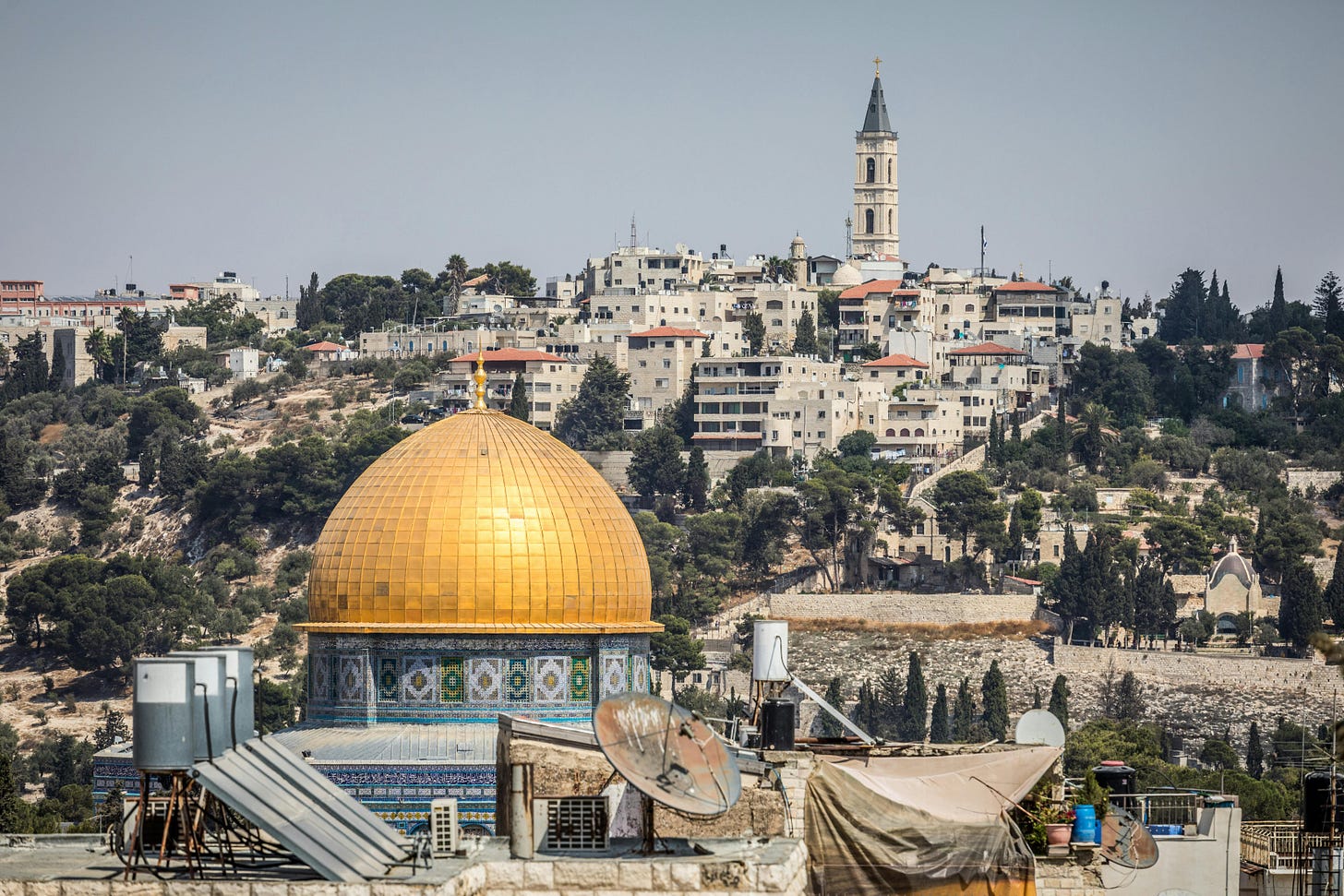Thoughts On Palestine
From a Guy Named Israel
A few months after the horrible attacks on Israel on October 7th, I attended an event and had an unexpected conversation. After exchanging pleasantries with the business owner, she looked at me and said, “Your name is Israel.” It wasn’t a question or even a statement of fact. She said it with an interesting look and tone that I couldn’t quite decipher, her eyes almost looking through me.
“Yeah,” I said, thinking maybe she was confusing me with someone else.
“My husband was born in Palestine,” she said.
By then, Gaza had already been under heavy bombardment and hundreds had died.
“Is he okay? I mean, is he back there?” I asked with genuine concern.
“He’s okay,” she said. “But my in-laws are still back in Gaza. We try and talk to them every day, but it’s getting more difficult.”
“I’m sorry,” I said. “I just wish this war would end it already.”
“Me too,” she said.
Over a year later, the war still continues. I often wonder if her husband's parents managed to escape. The number of Palestinians killed, many of them children, is in the tens of thousands. Reports indicate that more than a million people have been displaced. Entire neighborhoods have turned into rubble. Aid groups have warned that Gaza is facing one of the worst humanitarian crises in recent history. The United Nations has described it as “a man-made famine,” with children dying not only from bombs but also from starvation and disease.
It breaks my heart.
I have thought about that moment often. I remember how she looked at me when she said my name. I wondered how she felt meeting someone named Israel while her family was trapped in Gaza. Did she see me as a symbol of the country she believes has caused her family so much suffering? Did she view me simply as a man with an uncommon name? Or was it something in between, a strange clash of two worlds that shouldn't be connected yet are tied together by history, geography, and pain?
For most of my life, my name has just been my name. But names are never just names. They carry history, associations, and meanings you can't choose or escape. When I introduce myself, I often have to repeat my name, sometimes spell it, and sometimes brace myself for a reaction. Some people smile and say, "That's beautiful." Others frown and say nothing. Some crack jokes. But rarely has my name been met with as much depth as it was that day.
It made me reflect on what it means to carry a name linked to a place, a people, a history, and a conflict. I am not a nation. I am not a government. I am a man. Still, I cannot overlook the fact that my name stands for something much larger than myself. In times like these, when the world is in turmoil, that burden feels heavier.
The war between Israel and Hamas has devastated both groups. On October 7th, Hamas militants attacked Israeli towns, resulting in over 1,200 deaths and hundreds taken hostage. The images and stories from that day are horrifying; the kind of violence that leaves permanent scars. Israel responded with a large military operation in Gaza, which has killed far more civilians than fighters. The humanitarian situation is so desperate that doctors are performing surgeries without anesthesia, and families are eating grass to survive.
I can see the horror of October 7th, when innocent lives in Israel were taken in ways no one should ever endure. I can also see the devastation in Gaza, where bombs have destroyed neighborhoods and starvation has become a tool. It feels like a never-ending cycle, one that takes lives on both sides while the rest of the world debates politics and history.
When you strip everything else away, you have human beings. A woman worries about her in-laws in Gaza. A man wonders if his name reminds her of the enemy. Families sit in fear every night, whether in Sderot or Rafah. Parents hold their children close, praying that the next morning will come.
What I cannot escape is the ache. The ache of knowing that people like her in-laws are trying to survive in conditions that are nearly impossible to describe. The ache of knowing that children are buried daily. The ache of wondering if my own name carries a burden I did not ask for.
I cannot stop this war. Neither can you. But what we can do is refuse to lose our humanity
And maybe that is the only way forward, even if it feels impossibly far away. We need to keep seeing each other as human. We need to keep talking, even when the conversations are awkward and painful. We need to hold onto the hope that someday there will be peace, even if we cannot see the way there right now.
My name is Israel. It connects me to a story I did not write, one that is still unfolding with blood and tears. I cannot change that. But I can choose how I live with it. I can choose to listen, to care, and to refuse to give in to division. I can let my heart break, again and again, because that is better than letting it turn to stone.
And maybe, in some small way, that matters.
Thanks for reading.
If you’re able, consider upgrading your subscription or making a one-time donation, below.
Venmo: @Israel-Sanchez-148
Other Related Entries I’ve Written:
The Other Israel Sanchez (Paid Post)
News & Resources
Gaza famine likely to worsen as Israel ends pauses for aid deliveries


